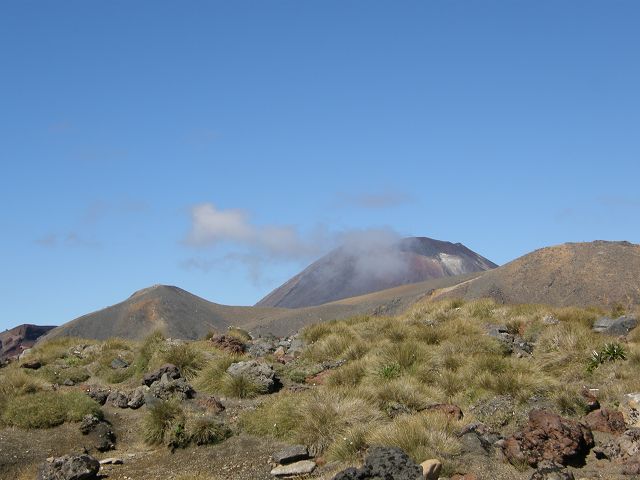 |
 Tongariro Crossing
Tongariro Crossing
The
Emerald Lakes are one of the most iconic features along the
Tongariro Alpine Crossing in
Tongariro National Park on
New Zealand's North Island. These stunning lakes are located near the
highest point of the crossing, at the base of the
Red Crater, and are famous
for their striking vibrant green color.
Key Features of the Emerald Lakes:
-
Vibrant Color: The
bright emerald green color of the lakes is due to the presence of
sulfur and other
minerals in the water, which give the lakes their unique hue. The
vibrant color stands in sharp contrast with the surrounding volcanic
landscape, making the lakes a popular spot for photography.
-
Volcanic Landscape: The
Emerald Lakes are situated in an active volcanic area, and the
surrounding terrain is filled with volcanic craters, steam vents, and
lava flows. The area is part of the
Tongariro volcanic system,
which is still active, and you may encounter steam vents along the way.
-
Cultural Significance:
The lakes and the surrounding area hold cultural significance for the
Māori people. Mount Tongariro
and the other volcanic peaks in the area are considered sacred, and many
Māori legends are associated with the mountains and their landscapes.
-
Location on the Track:
The Emerald Lakes are located around the
Red Crater, which is
the highest point of the
Tongariro Crossing. After reaching the top of the Red Crater,
you’ll descend slightly to reach the lakes, offering an incredible
panoramic view of the surrounding volcanic landscape.
|
Die Tongariro Alpine Crossing ist eine der
bekanntesten und spektakulärsten Tageswanderungen Neuseelands und gilt als
eine der besten Wanderungen der Welt. Sie führt durch das Herz des Tongariro
National Park, des ältesten Nationalparks Neuseelands und eines
UNESCO-Weltkulturerbes. Die Wanderung bietet atemberaubende vulkanische
Landschaften, farbenfrohe Kraterseen und spektakuläre Aussichten auf die
umliegenden Berge.
Highlights der Tongariro Alpine Crossing:
Vulkanische Landschaft:
Die Wanderung führt durch eine dramatische
vulkanische Landschaft, die von den Vulkanen Mount Tongariro und Mount
Ngauruhoe (auch bekannt als Mount Doom aus „Der Herr der Ringe“) geprägt
ist.
Emerald Lakes:
Die smaragdgrünen Seen sind eines der
bekanntesten Highlights der Wanderung. Ihre intensive Farbe entsteht durch
mineralische Ablagerungen aus den umliegenden Thermalquellen.
Red
Crater:
Der Red Crater ist ein beeindruckender vulkanischer Krater,
der durch seine rote Färbung und seine steilen Wände besticht. Von hier aus
hat man einen spektakulären Blick auf die Emerald Lakes und die umliegende
Landschaft.
Mount Ngauruhoe:
Der ikonische Vulkan ist ein
markantes Wahrzeichen der Wanderung. Er ist bekannt als „Mount Doom“ aus den
Filmen „Der Herr der Ringe“.
Ketetahi Hut:
Die Ketetahi Hut
ist eine Raststation auf der Wanderung und bietet einen guten Ort, um sich
auszuruhen und die Aussicht zu genießen.
Aussichtspunkte:
Die
Wanderung bietet zahlreiche Aussichtspunkte, von denen aus man die
umliegenden Berge, Täler und Seen bewundern kann.
Informationen zur
Wanderung:
Länge: 19,4 Kilometer (einfache Strecke)
Dauer: 6–8
Stunden (abhängig von der Fitness und den Wetterbedingungen)
Schwierigkeitsgrad: Mittel bis anspruchsvoll
Höhenunterschied: Der
höchste Punkt der Wanderung ist der Red Crater auf 1.886 Metern.
Vorbereitung und Tipps:
Wetter:
Das Wetter in den neuseeländischen
Alpen kann schnell wechseln. Es ist wichtig, wetterfeste Kleidung,
Sonnenschutz und ausreichend Wasser mitzunehmen.
Überprüfe die
Wettervorhersage vor der Wanderung und sei auf alle Bedingungen vorbereitet.
Ausrüstung:
Gutes Schuhwerk, warme Kleidung, Regenjacke,
Sonnencreme, Hut, ausreichend Wasser und Snacks sind unerlässlich.
Ein Wanderstock kann hilfreich sein, besonders beim Abstieg.
Transport:
Die Wanderung ist eine Streckenwanderung, daher ist es
notwendig, den Transport vom Ende der Wanderung zurück zum Ausgangspunkt zu
organisieren. Es gibt Shuttlebusse, die diesen Service anbieten.
Fitness:
Die Wanderung ist anspruchsvoll und erfordert eine gute
körperliche Fitness. Es ist wichtig, sich vorher ausreichend vorzubereiten.
Respektiere die Natur:
Halte die Wanderwege sauber und
respektiere die Umwelt. Nimm deinen Müll mit und störe die Tierwelt nicht.
Beste Zeit für die Wanderung:
Saison: Die beste Zeit für die
Tongariro Alpine Crossing ist von November bis April, wenn das Wetter
stabiler ist und die Wanderwege in gutem Zustand sind.
Winter: Im
Winter kann die Wanderung aufgrund von Schnee und Eis gefährlich sein und
erfordert spezielle Ausrüstung und Erfahrung.
Warum die Tongariro
Alpine Crossing wandern?
Die Tongariro Alpine Crossing ist ein
unvergessliches Erlebnis, das die dramatische Schönheit der neuseeländischen
Vulkanlandschaft in ihrer ganzen Pracht zeigt. Mit ihren farbenfrohen Seen,
steilen Kratern und spektakulären Aussichten ist die Wanderung ein Muss für
jeden Naturliebhaber und Abenteurer. Sie bietet eine einzigartige
Gelegenheit, die atemberaubende Landschaft des Tongariro National Park zu
erleben und die Kraft der Natur zu spüren. |
The
Tongariro Crossing is one of New Zealand's most famous and
challenging one-day hikes, located in the
Tongariro National Park on
the North Island. It offers breathtaking views of volcanic landscapes,
crater lakes, and diverse ecosystems, making it a must-do trek for many
outdoor enthusiasts. Here's all you need to know about the
Tongariro Crossing:
Overview:
-
Length: The hike is
19.4 kilometers (about
12 miles) long, and typically takes
6-8 hours to complete,
depending on your pace and stops along the way.
-
Difficulty: The trek is
considered moderate to difficult
due to the length, elevation, and challenging terrain. It includes steep
ascents and descents, as well as some rocky and uneven paths. However,
it's not a technical climb, so no specialized climbing skills are
required.
-
Elevation Gain: The
hike ascends to an altitude of
1,886 meters (6,188 feet) at the summit of
Red Crater, with a
total elevation gain of around
1,000 meters (3,280 feet).
Location:
- The
Tongariro Crossing is
situated in Tongariro National
Park, a UNESCO World Heritage Site. The park is home to three
active volcanic mountains:
Mount Tongariro,
Mount Ngauruhoe, and
Mount Ruapehu.
- The trail runs between
Mangatepopo Valley
and Ketetahi Hut,
with spectacular views of the surrounding volcanic terrain, including
craters, lava fields, and emerald lakes.
Key Highlights of the Tongariro
Crossing:
-
Mount Ngauruhoe (Mount Doom):
The trek provides stunning views of
Mount Ngauruhoe,
which is famous as the fictional
Mount Doom in
The Lord of the Rings film
trilogy. Many hikers choose to climb it, though it adds additional
difficulty to the hike and takes extra time.
-
Red Crater: The
highest point of the track,
Red Crater offers magnificent views of the surrounding volcanic
landscape. From here, you can see the active crater and the contrasting
colors of the rugged terrain.
-
Emerald Lakes: These
vibrant, bright green lakes are formed in volcanic craters and are one
of the most photographed features along the crossing. The colors of the
lakes are due to the minerals and sulfur in the water.
-
Blue Lake: This is a
beautiful alpine lake that sits near the end of the track, offering
another serene spot for rest and photographs.
-
Volcanic Terrain:
Hikers will encounter a variety of volcanic features, including lava
flows, craters, steam vents, and fumaroles. The stark, barren landscape
contrasts with the lush surroundings lower down.
-
Alpine Vegetation:
The lower parts of the hike offer a change in vegetation, with tussock
grasses and alpine shrubs before descending into more lush forest toward
the end of the trail.
Best Time to Do the Crossing:
-
Summer (November to April)
is the best time to do the
Tongariro Crossing, as the weather is generally more favorable,
and the track is snow-free. However, the weather in this region can
change quickly, so it's essential to be prepared for all conditions,
including rain, wind, or even snow, regardless of the season.
-
Winter (May to October):
The hike becomes much more challenging in winter due to snow and ice,
and it's not recommended unless you're an experienced winter hiker and
have the necessary gear.
Important Tips:
-
Weather: The weather
in the Tongariro National Park can be unpredictable, so always check the
forecast before starting. It's crucial to be prepared with appropriate
clothing and gear for all conditions.
-
Transport: There is
no public transport directly to the start and end points of the track,
so many people take shuttle buses that operate between
Mangatepopo and
Ketetahi. You can
book these buses in advance.
-
Guides: If you're
unfamiliar with alpine hiking or the terrain, there are guided tours
available, which can enhance the experience and safety.
-
Preparation: Bring
enough water, food, and sunscreen for the entire day, and wear sturdy,
comfortable footwear suited for rough terrain.
-
Safety: Be aware of
the volcanic risks in the area. Although eruptions are rare, it’s
important to follow safety guidelines and be cautious around craters and
vents. The Department of
Conservation (DOC) provides up-to-date information on track
conditions and volcanic activity.
Conservation and Environmental
Responsibility:
-
Leave No Trace: The
Tongariro Crossing is a protected area, so it's important to follow
Leave No Trace principles, including cleaning up after yourself and
staying on designated paths.
-
Volcanic Activity:
Always check for updates on volcanic activity, as the Tongariro area is
an active volcanic zone. Occasionally, certain parts of the park may be
closed for safety reasons.
Conclusion:
The Tongariro Crossing is
one of the best day hikes in New Zealand, offering dramatic views,
fascinating volcanic features, and a sense of adventure. Whether you're a
nature lover, a photography enthusiast, or a Lord of the Rings fan, the
crossing is an unforgettable experience!
|
 Safaris
Bergsteigen
Wandern
Inselwandern Weltweit
Safaris
Bergsteigen
Wandern
Inselwandern Weltweit
 Europa
Inselwandern
Europa
Inselwandern
 Städtewandern
Städtewandern
 Paintings
Paintings Dirk Rauschenbach
Dirk Rauschenbach
 Safaris
Bergsteigen
Wandern
Inselwandern Weltweit
Safaris
Bergsteigen
Wandern
Inselwandern Weltweit
 Europa
Inselwandern
Europa
Inselwandern
 Städtewandern
Städtewandern
 Paintings
Paintings Dirk Rauschenbach
Dirk Rauschenbach
![]() 26.07.25 Copyright Dirk
Rauschenbach Koelnerstrasse 293 51702 Bergneustadt
Datenschutzerklaerung 02261 9788972 Mail ccooly(
at) web.de
26.07.25 Copyright Dirk
Rauschenbach Koelnerstrasse 293 51702 Bergneustadt
Datenschutzerklaerung 02261 9788972 Mail ccooly(
at) web.de